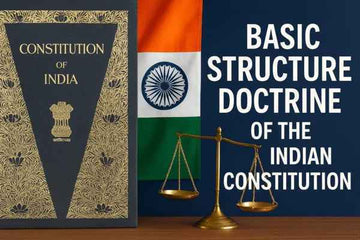The Indian Constitution is a living document, constantly evolving to meet society's changing needs. One of the most significant concepts to have emerged from this evolution is the Basic Structure Doctrine, which acts as a guardian of the Constitution’s core values. A thorough understanding of this doctrine is essential for UPSC aspirants, especially for subjects like Indian Polity, Governance, and Constitutional Law. This blog explores every facet of the Basic Structure Doctrine, from its historical roots to its modern-day implications.
What is the Basic Structure Doctrine?
The Basic Structure Doctrine is a judicial principle that states that while the Parliament has wide powers to amend the Constitution under Article 368, it cannot alter or destroy the “basic structure” or essential features of the Constitution.
This doctrine ensures that the fundamental framework and guiding principles of the Constitution remain intact, irrespective of the political or legislative majorities in power.
Key Point:
The Basic Structure Doctrine is not explicitly mentioned in the Constitution. It is a judicial innovation, developed by the Supreme Court of India to safeguard constitutional values.
Historical Background
- Shankari Prasad v. Union of India (1951)
- The First Amendment was challenged for violating Fundamental Rights.
- The Supreme Court held that Parliament’s power to amend the Constitution included the power to amend Fundamental Rights.
- Sajjan Singh v. State of Rajasthan (1965)
- Reiterated the Shankari Prasad judgment.
- Parliament could amend any part of the Constitution.
These early judgments prioritized Parliamentary supremacy, but rising concerns about authoritarianism led to a legal rethinking.
- Golaknath v. State of Punjab (1967)
- Overturned previous decisions.
- Held that Parliament could not amend Fundamental Rights.
- Introduced the idea of a limited amendment power.
Kesavananda Bharati Case (1973): The Turning Point
This landmark case laid down the foundation for the Basic Structure Doctrine.
- Case Details:
- Full Name: Kesavananda Bharati v. State of Kerala
- Bench: 13-judge Constitutional Bench
- Verdict: 7:6 majority
- Outcome:
- Parliament can amend any part of the Constitution, including Fundamental Rights.
- But it cannot alter the "basic structure" of the Constitution.
- Significance:
- This judgment limited Parliament's amending power.
- Ensured judicial review as a check on legislative power.
Elements of the Basic Structure
The Supreme Court has not given a definitive list, but through various judgments, it has recognized several features as part of the basic structure:
- Supremacy of the Constitution
- Sovereign, Democratic, and Republic nature of India
- Secularism
- Rule of Law
- Separation of Powers
- Judicial Review
- Federalism
- Unity and Integrity of the Nation
- Free and Fair Elections
- Independence of the Judiciary
- Harmony between Fundamental Rights and Directive Principles
- Parliamentary System of Government
- Welfare State
- Dignity of the Individual
These elements ensure that the spirit of the Constitution remains inviolable.
Important Supreme Court Judgments Shaping the Doctrine
- Indira Nehru Gandhi v. Raj Narain (1975)
- The 39th Amendment was declared unconstitutional.
- Emphasized that free and fair elections are part of the basic structure.
- Minerva Mills v. Union of India (1980)
- Struck down parts of the 42nd Amendment.
- Reinforced the balance between Fundamental Rights and Directive Principles as essential to the basic structure.
- Waman Rao v. Union of India (1981)
- Drew a clear line between pre-1973 and post-1973 amendments.
- Post-1973 amendments could be reviewed against the Basic Structure Doctrine.
- R. Bommai v. Union of India (1994)
- Defined secularism as part of the basic structure.
- Restricted misuse of Article 356 (President's Rule).
- R. Coelho v. State of Tamil Nadu (2007)
- Even laws placed under the 9th Schedule after 1973 can be struck down if they violate the basic structure.
Basic Structure vs Parliamentary Sovereignty
Some critics argue that the Basic Structure Doctrine curtails Parliamentary Sovereignty. However, in a Constitutional Democracy, Parliament is not supreme—the Constitution is.
The doctrine acts as a check and balance to ensure that no ruling party or coalition can dismantle the foundational principles of the Indian Republic.
Why the Basic Structure Doctrine Matters?
- Prevents Authoritarianism
It blocks attempts to centralize power or eliminate democratic safeguards.
- Protects Individual Rights
It ensures that Fundamental Rights are not diluted by opportunistic legislation.
- Strengthens Judicial Review
The doctrine empowers the judiciary to act as the guardian of the Constitution.
- Preserves Federal Structure
It ensures the distribution of power between the Union and the States remains balanced.
- Promotes Constitutional Morality
It upholds values such as liberty, equality, and fraternity, which form the bedrock of the Indian polity.
Relevance for UPSC Aspirants
The Basic Structure Doctrine is a high-probability topic in the UPSC Civil Services Examination.
- Prelims:
- Questions related to Article 368, landmark cases, and amendment procedures.
- Mains (GS Paper 2):
- Analytical questions on constitutionalism, judicial review, and balance of power.
Sample Question:
"Discuss the significance of the Basic Structure Doctrine in safeguarding the Indian Constitution. Do you agree that it acts as a necessary limitation on Parliamentary powers?"
Essay Paper:
- Topics like Democracy in India, Role of Judiciary, Constitutional Morality can include references to this doctrine.
How to Study the Basic Structure Doctrine for UPSC?
-
Start with NCERTs – Especially Class 11 and 12 Political Science.
Resource Linked: UPSC NCERT 2025 : NCERT Summary Class 6 to 12 (Set of 6) for Civil Services & State PSC Exam
- Make Notes – On landmark judgments and key elements.
- Practice Answer Writing – Frame balanced answers with judicial and constitutional viewpoints.
- Revise Regularly – Use mind maps and flowcharts for quick revisions.
Conclusion: The Cornerstone of Constitutional Democracy
The Basic Structure Doctrine is not just a legal innovation; it is a moral compass that guides the Indian Constitution through changing times. It ensures that while the Constitution can adapt and evolve, its core values remain inviolable.
For UPSC aspirants, understanding this doctrine is crucial not just for exams but also for appreciating the depth, foresight, and resilience of the Indian democratic framework.
The doctrine reminds us that the Constitution is more than a legal document—it is a living testament to the ideals of justice, liberty, equality, and fraternity.
Crack UPSC and State PCS with ease! Essentials of Indian Polity Constitution & Governance by Neeharika Reddy makes tough topics simple and interesting. With real case laws, key laws, and smart explanations, it’s the perfect book to understand polity and write better answers in exams.
Frequently Asked Questions (FAQs)
- Is the Basic Structure Doctrine mentioned in the Constitution?
No, it is a judicial principle developed by the Supreme Court, especially in the Kesavananda Bharati case (1973).
- Can Parliament amend the Basic Structure?
No, Parliament cannot alter or destroy the basic structure through constitutional amendments.
- Why is it important for democracy?
It prevents authoritarian tendencies and preserves the spirit of the Constitution.
- Which cases should UPSC aspirants focus on?
- Kesavananda Bharati (1973)
- Minerva Mills (1980)
- S.R. Bommai (1994)
- I.R. Coelho (2007)
Stay tuned for more insightful blogs on Indian Polity, Judiciary, and Constitutional Law, especially tailored for UPSC preparation!







